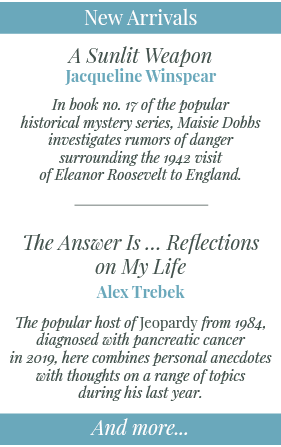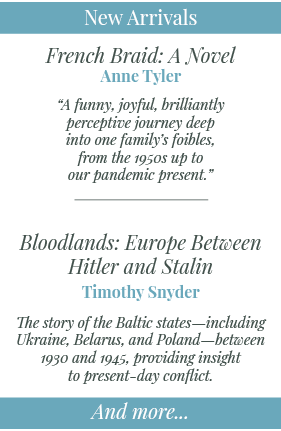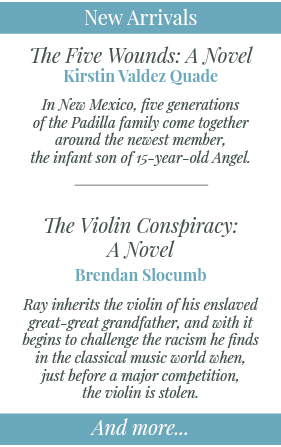her a picture of a small gold-colored beetle in a picture book of mythical animals. She is spellbound. She will go to New Caledonia, wherever that is, and find the beetle.
Rachel Joyce’s fifth novel, Miss Benson’s Beetle, is the story of two women on a life-altering quest to find this undiscovered beetle. It is clear from the text that the author has either some entomological training or has done her beetle research (the latter, as revealed in acknowledgments). The year is 1950 in war-weary London; rationing is still a fact of life in England. Margery Benson is a forty-six-year-old spinster teaching domestic science to girls who are bored stiff. Her life takes a dramatic turn when she is the butt of a cruel joke perpetrated by her students. Humiliated, she abruptly ends her lesson on how to make a cake in wartime, and walks out of the classroom never to return. She realizes this is her moment. It’s time to risk everything, fulfill her dream and find the gold beetle. She advertises for an assistant to help with the expedition to the other side of the world. Out of candidates and desperate, she offers the job to Mrs. Enid Pretty, who appears unsuited for the position in every respect. Mrs. Pretty also seems suspiciously eager to get out of town. The two women could not be more different. Physically, Margery is a large woman, tall and big-boned. Enid is petite, young, blond and attractive. Enid is a risktaker and not reluctant to use her charms to get what she wants. Joyce’s writing style is clever, full of surprises and occasional humor. I found it captivating. For example, when describing one of the British wives of government officials stuck in New Caledonia, Joyce writes, “She was a sweet person, but her intelligence she saved for special occasions.” Or in describing history, “History is not made up by events alone, but also by what lies between the lines.” As the search gets underway in New Caledonia, the two women, completely out of their depth, face unimaginable hardship, cyclones, illness, a deranged stalker, and the threat of arrest. Enid becomes surprisingly insightful and a source of strength, reminding Margery, when she gets discouraged, that her vocation in life is to find the beetle. Enid’s vocation is to bring a pregnancy to a successful conclusion. In the weeks of searching they become more and more interdependent, and they reveal more and more intimate facts about their past lives that cements the closest of friendships. In the end, do they find the gold beetle? Can’t say. Does it even exist at all? I’m an entomologist, and I have no idea if it does or not. Among the 200,000 species of beetles worldwide, maybe it does. In a postscript, Joyce interviews her two fictional characters, an intriguing literary device that answers some questions not divulged in the story. I thoroughly enjoyed this book, despite being a little disappointed with the ending. I would recommend it to any reader, not just women or beetle lovers. A copy was recently added to the Coffman library.
On the lighter side, there is Bartlett’s Book of Anecdotes, an alphabetical romp through short episodes from over 4,000 individuals who spoke with some wit. I’ll quote just one, Erasmus of Rotterdam (d.1536). “Reproached for not observing the Lenten fast, Erasmus replied, “I have a Catholic soul, but a Lutheran stomach.” I challenge you to put down this tome after reading just one anecdote.
The New Fowler’s Modern English Usage is promising as a browser for anyone interested in words. Looking for girl (“rhymes with curl, pearl, and whirl,” unless you’re Cockney), I reaffirmed that since the 1960s, it’s best to call an adult female a woman, but guys still go with girlfriends. Devil’s advocate: “one who advocates the contrary or wrong side” (OED). “It does not mean one who pleads for a wicked person.” Espresso means “pressed-out,” referring to coffee, and there was once a variant (still sometimes heard today), expresso, “presumably invented under the impression that [it] meant ‘fast, express.’” The Oxford Dictionary of Phrase, Saying, and Quotation is divided by topic, of which there are over 400. Each topic begins with a few proverbs and sayings, followed by phrases, and finally credited quotations. Obscure sayings and quotes are explained in italics, and cross-references are numerous. Under Equality see also Human Rights, George Orwell, 1945, “All animals are equal but some animals are more equal than others,” and W.S. Gilbert, 1889, “When everyone is somebodee, Then no one’s anybody.” Under Excellence and Mediocrity see also Perfection, Joseph Heller, 1979, “If Richard Nixon was second-rate, what in the world is third-rate?” (I think we know the answer to that one.) George W. Bush, 2001, “To those of you who received honours, awards and distinctions, I say well done. And to the C students, I say you, too, can be president of the United States.” Finally, under Old Age see also Middle Age, Oscar Wilde, 1891, “The tragedy of old age is not that one is old, but that one is young.” If you haven’t guessed, we have these books in the Reference Collection in the second floor of the Library on the window wall. Have you seen the Reference Book collection? Most of these were donated by residents. Once the mainstay of libraries, they have been superseded by the Internet, and may no longer be updated with new editions. The wonderful movie The Desk Set, starring Spencer Tracy and Katharine Hepburn, predates the Internet. Hepburn, head reference librarian, goes head to head with Tracy, the brains behind a company that plans to steamroll over the librarians’ reference service with its room-sized computer. You can guess how this ends. The printed page wins. Today pretty much anything you would search for in a reference book can be searched on Google or another search engine. Have you cracked open a reference book in the Library since you moved here? What are your thoughts on this collection? |
NewsletterCoffman residents, signup for monthly updates from the Library! Thank you!You have successfully joined our subscriber list. Posts by Year
All
Posts by Month
July 2024
|


